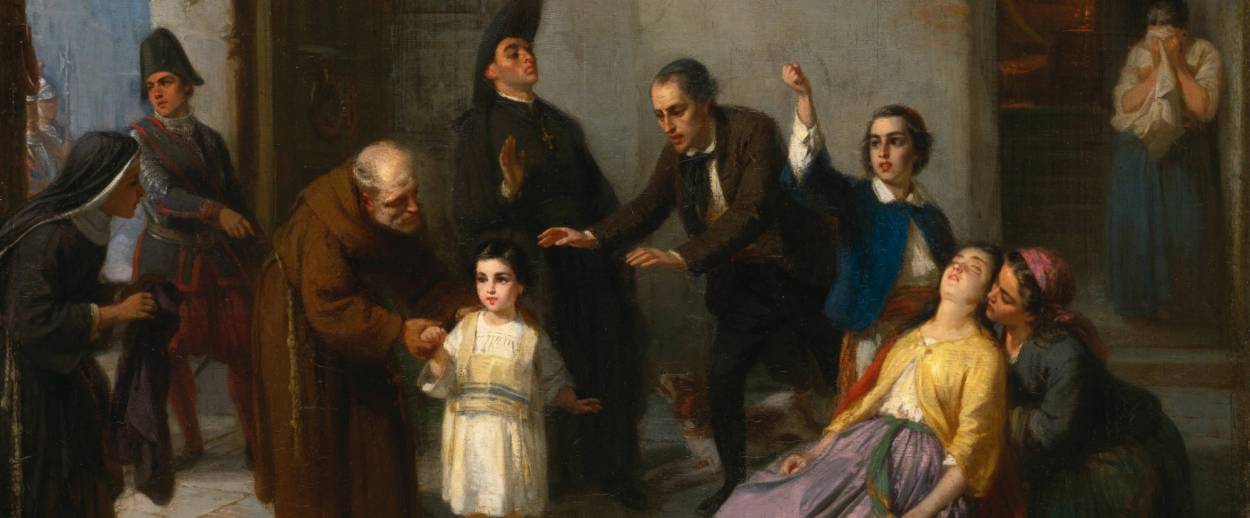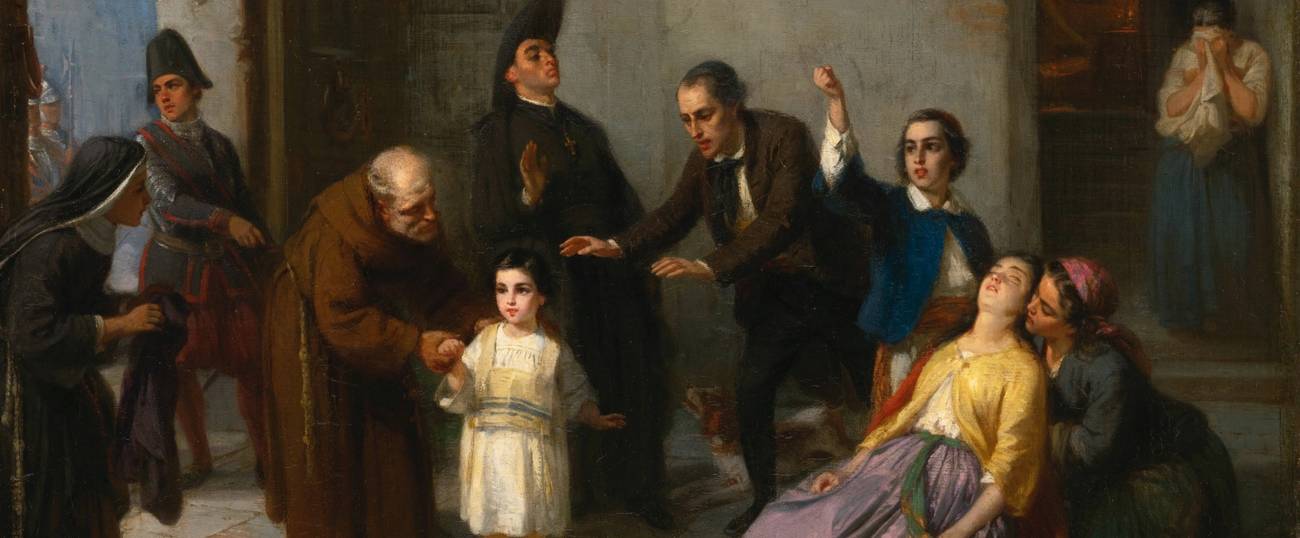‘First Things’ Publishes Defense of Notorious Historic Kidnapping and Forced Conversion of Jewish Boy, Debate Ensues
A century and a half later, the Edgardo Mortara case, soon to be a Steven Spielberg film, continues to challenge the faithful




The most addictively fascinating controversy now percolating through the American Catholic Internet has to do with the fate of a Jewish-born child seized from his family nearly 150 years ago. Last week, First Things published a book review essay by the Dominican priest Romanus Cessario, arguing that Pope Pius IX had acted correctly in forcibly separating the Jewish-born six-year-old Edgardo Mortara away from his parents in 1858. A Catholic caretaker secretly baptized the infant Mortara when he was dying and thought to be beyond recovery. Mortara survived his illness, and five years later, Pius IX, who was the head of state in the Mortara family’s Bologna, ordered that the boy be taken from his parents and made the pope’s personal ward in order to ensure that the now-Catholic child could be brought up in accordance with his religion. Mortara eventually became a Catholic priest, and died in 1940.
Cessario argues that Pius IX decided the case in accordance with what Canon and civil law required in the Papal states of the late 1850s. More importantly, the Pope affirmed the spiritual and metaphysical meaning of baptism, even amid an international outcry over the affair. “Christians who are tempted to side with the enlightened critics of [Pius IX],” Cessario writes at the close of the essay, “should examine how much they themselves prize the gifts of supernatural grace that ennoble human nature.”
The article met with torrents of criticism—“Catholic Magazine Justifies Kidnapping, Converting Jewish Baby,” reads a headline at The Forward. A lot of the opposition to Cessario, however, came from tradition-minded Christians. Joseph Shaw, a Catholic scholar and chairman of the Latin Mass Society, calls the Mortara case “one of the most indefensible actions by any Pope of modern times,” wryly observing that “the whole point of being Traditional Catholics is that we are not slaves of the daily thoughts and doings of Popes.” Cessario’s article also put a Catholic priest on record as defending the state-sanctioned separation of a halachically Jewish child from his own family, which was a source of queasiness for the American Conservative’s Rod Dreher, a non-Catholic who is nevertheless the author of traditionalist manifesto The Benedict Option. “This is monstrous,” Dreher wrote. “They stole a child from his mother and father! And here, in the 21st century, a priest defends it, saying it was for the child’s own good.”
Part of the fun—and the danger—of religion is hashing out theological and historical debates that are far older than this one: The Mortara affair is pretty recent compared to still-simmering fissures over transubstantiation or the true nature of Christ, while Jews can be passionately divided over the relevance of the temple sacrifices to modern-day practice and belief, despite (or because of) the fact the most recent ones were held some 2,000 years ago. Little surprise that the discussion of Cessario’s essay is taking on such an urgent tone—although, contra the Forward’s particular framing, the debate has had far more to do with Christians’ relationship to their own beliefs than with their relationship to Jews.
Shaw argued that Cessario was oblivious to an endemic Catholic distrust of the state, something that is hardly canceled when the Pope is in charge of the state in question. “Is [the Mortara affair], then, not about the Faith directly? No, it isn’t. It is about the exercise of temporal power in the Papal States,” wrote Shaw. “The integrity of the family in general, and the rights of parents over children in particular, do not exist at the pleasure of the state: As the Church has consistently taught, they predate the state and their prerogatives cannot be overridden by the state.” Shaw views reflexive devotion to religiously-sanctioned earthly power as little different than the liberal-secular tyranny under which Americans and Europeans supposedly now toil.
Then there’s Cessario’s alleged defense of kidnapping a Jew. Legal scholar Robert T. Miller wrote that the editors of First Things “deserve to be roundly vituperated for doing so much damage to the good relations Richard John Neuhaus and his many Jewish collaborators at First Things were able to build over so many years.” Shaw raises a similar point. The church’s era of kidnapping Jewish children is thankfully over. Why wax nostalgic over it? Why defend this, of all things? (In the interest of full disclosure, I’ve written for First Things twice, most recently this month).
One explanation is that ecumenically-minded publications that ply that uncomfortable frontier where soul and society meet should be permitted the freedom of their intellectual ambitions, considering that, like Cessario’s, their arguments are reasoned and instructive. One reason for taking a pro-Pius IX position in 2018, Cessario argued, is that young Mortara’s situation arguably represents one of the ultimate cases of fulfilling what faith actually requires of its adherents, in spite or even because of the unpalatable realities of living one’s beliefs. Mortara was baptized; Christians believe that baptism is an immutable ontological state. Such, Cessario claimed, was life as Catholics were supposed to understand it: “A baptized Christian is called to set out on a supernatural life of faith, hope, and charity, or what the Catechism twice refers to as the ‘theological’ life, which includes religious instruction and access to the means of grace, notably the Eucharist. These articles of faith bound Pius to give Mortara a Catholic upbringing that his parents could not.” Either baptism means what Catholics believe it to mean, or it doesn’t; the extremity of the test-case only highlights that the doctrine is beyond compromise.
In his critique, Miller rejected this reasoning, writing that he “never perceived a logical connection between the indelibility of the sacramental character conferred in baptism and the claimed right of the Papal States to forcibly transfer custody of Mortara from his parents to Pius IX. Moreover, on this crucial point, Cessario is no help at all, for he apparently thinks the connection is self-evident.” The idea that this connection is “self-evident” seems to be at the heart of Cessario’s essay: For him, the Papal government’s obligation to a baptized soul overrode familial considerations, period.
The other possible reason for mounting a defense of Pius IX at this particular moment may have less to do with faith and more with film: Steven Spielberg and Tony Kushner are currently collaborating on a film about the affair, due for release sometime during the 2019 awards season. It’s only fair to guess that some Catholics will soon be inclined to defend the alleged excesses of their church against any and all pop-cultural inquisitors. Both Shaw and Dreher addressed this concern in their comments, expressing regret that the filmmakers aren’t tackling other topics but also stressing the belief that addressing Spielberg’s movie doesn’t require a defense of the underlying act itself.
So, again, why defend it? Why not indulge in some other thought experiment to prove a similar point about the status of a baptized soul, or the sometimes-unsavory realities of taking faith seriously? The answer is that there are some interesting present-day dimensions to the Mortara controversy, even if they’re not all that obvious to outside observers, and aren’t all that explicit in Cessario’s essay. As Ross Douthat noted on Twitter, the Mortara affair is an intriguing test-case for how tradition-minded Catholics view the Church’s relationship to political action: “It was a weird case but it was perfectly in keeping w/general logic that drove inquisitions and persecutions,” The New York Times columnist tweeted. “So how a Catholic post-liberalism deals with Mortara is highly relevant to how it deals w/the larger legacy of Catholic coercion/persecution of Protestants and others.” Douthat appeared to defend the publication of the essay, tweeting that it “really does bring an ongoing intra-Catholic argument to a necessarily sharp point.” The debate continues.
Armin Rosen is a staff writer for Tablet Magazine.